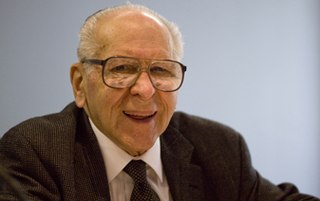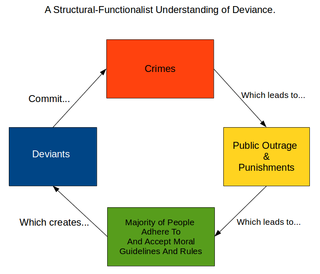Involuntary commitment, civil commitment, or involuntary hospitalization/hospitalisation is a legal process through which an individual who is deemed by a qualified agent to have symptoms of severe mental disorder is detained in a psychiatric hospital (inpatient) where they can be treated involuntarily. This treatment may involve the administration of psychoactive drugs, including involuntary administration. In many jurisdictions, people diagnosed with mental health disorders can also be forced to undergo treatment while in the community; this is sometimes referred to as outpatient commitment and shares legal processes with commitment.
A mental disorder, also referred to as a mental illness, a mental health condition, or a psychiatric disorder, is a behavioral or mental pattern that causes significant distress or impairment of personal functioning. A mental disorder is also characterized by a clinically significant disturbance in an individual's cognition, emotional regulation, or behavior, often in a social context. Such disturbances may occur as single episodes, may be persistent, or may be relapsing–remitting. There are many different types of mental disorders, with signs and symptoms that vary widely between specific disorders. A mental disorder is one aspect of mental health.
Outpatient commitment—also called assisted outpatient treatment (AOT) or community treatment orders (CTO)—refers to a civil court procedure wherein a legal process orders an individual diagnosed with a severe mental disorder to adhere to an outpatient treatment plan designed to prevent further deterioration or recurrence that is harmful to themselves or others.
Anti-psychiatry, sometimes spelled antipsychiatry without the hyphen, is a movement based on the view that psychiatric treatment is often more damaging than helpful to patients, highlighting controversies about psychiatry. Objections include the reliability of psychiatric diagnosis, the questionable effectiveness and harm associated with psychiatric medications, the failure of psychiatry to demonstrate any disease treatment mechanism for psychiatric medication effects, and legal concerns about equal human rights and civil freedom being nullified by the presence of diagnosis. Historical critiques of psychiatry came to light after focus on the extreme harms associated with electroconvulsive therapy or insulin shock therapy. The term "anti-psychiatry" is in dispute and often used to dismiss all critics of psychiatry, many of whom agree that a specialized role of helper for people in emotional distress may at times be appropriate, and allow for individual choice around treatment decisions.

Thomas Stephen Szasz was a Hungarian-American academic and psychiatrist. He served for most of his career as professor of psychiatry at the State University of New York Upstate Medical University in Syracuse, New York. A distinguished lifetime fellow of the American Psychiatric Association and a life member of the American Psychoanalytic Association, he was best known as a social critic of the moral and scientific foundations of psychiatry, as what he saw as the social control aims of medicine in modern society, as well as scientism.

The Rosenhan experiment or Thud experiment was an experiment conducted to determine the validity of psychiatric diagnosis. Participants submitted themselves for evaluation at various psychiatric institutions and feigned hallucinations in order to be accepted, but acted normally from then onward. Each was diagnosed with psychiatric disorders and were given antipsychotic medication. The study was conducted by psychologist David Rosenhan, a Stanford University professor, and published by the journal Science in 1973 under the title "On Being Sane in Insane Places".

Forensic psychiatry is a subspeciality of psychiatry and is related to criminology. It encompasses the interface between law and psychiatry. According to the American Academy of Psychiatry and the Law, it is defined as "a subspecialty of psychiatry in which scientific and clinical expertise is applied in legal contexts involving civil, criminal, correctional, regulatory, or legislative matters, and in specialized clinical consultations in areas such as risk assessment or employment." A forensic psychiatrist provides services – such as determination of competency to stand trial – to a court of law to facilitate the adjudicative process and provide treatment, such as medications and psychotherapy, to criminals.

Suicide prevention is a collection of efforts to reduce the risk of suicide. Suicide is often preventable, and the efforts to prevent it may occur at the individual, relationship, community, and society level. Suicide is a serious public health problem that can have long-lasting effects on individuals, families, and communities. Preventing suicide requires strategies at all levels of society. This includes prevention and protective strategies for individuals, families, and communities. Suicide can be prevented by learning the warning signs, promoting prevention and resilience, and committing to social change.
Laura's Law is a California state law that allows for court-ordered assisted outpatient treatment. To qualify for the program, the person must have a serious mental illness plus a recent history of psychiatric hospitalizations, jailings or acts, threats or attempts of serious violent behavior towards self or others. A complete functional outline of the legal procedures and safeguards within Laura's Law has been prepared by NAMI San Mateo.

Emergency psychiatry is the clinical application of psychiatry in emergency settings. Conditions requiring psychiatric interventions may include attempted suicide, substance abuse, depression, psychosis, violence or other rapid changes in behavior.
Kendra's Law, effective since November 1999, is a New York State law concerning involuntary outpatient commitment also known as assisted outpatient treatment. It grants judges the authority to issue orders that require people who meet certain criteria to regularly undergo psychiatric treatment. Failure to comply could result in commitment for up to 72 hours. Kendra's Law does not mandate that patients be forced to take medication.

Deinstitutionalisation is the process of replacing long-stay psychiatric hospitals with less isolated community mental health services for those diagnosed with a mental disorder or developmental disability. In the late 20th century, it led to the closure of many psychiatric hospitals, as patients were increasingly cared for at home, in halfway houses and clinics, in regular hospitals, or not at all.
Assertive community treatment (ACT) is an intensive and highly integrated approach for community mental health service delivery. ACT teams serve individuals who have been diagnosed with serious and persistent forms of mental illness, predominantly but not exclusively the schizophrenia spectrum disorders. ACT service recipients may also have diagnostic profiles that include features typically found in other DSM-5 categories. Many have histories of frequent psychiatric hospitalization, substance abuse, victimization and trauma, arrests and incarceration, homelessness, and additional significant challenges. The symptoms and complications of their mental illnesses have led to serious functioning difficulties in several areas of life, often including work, social relationships, residential independence, money management, and physical health and wellness. By the time they start receiving ACT services, they are likely to have experienced failure, discrimination, and stigmatization, and their hope for the future is likely to be quite low.

Gun-related violence is violence committed with the use of a firearm. Gun-related violence may or may not be considered criminal. Criminal violence includes homicide, assault with a deadly weapon, and suicide, or attempted suicide, depending on jurisdiction. Non-criminal violence includes accidental or unintentional injury and death. Also generally included in gun violence statistics are military or para-military activities.
Alexander H. Leighton was a sociologist and psychiatrist of dual citizenship. He is best known for his work on the Stirling County (Canada) Study and his contributions to the field of psychiatric epidemiology. Leighton died at the age of 99 at his home in Digby, Nova Scotia.
The obligatory dangerousness criterion is a principle present in the mental health law of many developed countries. It mandates evidence of dangerousness to oneself or to others before involuntary treatment for mental illness. The term "dangerousness" refers to one's ability to hurt oneself or others physically or mentally within an imminent time frame, and the harm caused must have a long-term effect on the person(s).

Lee Nelken Robins was an American professor of social science in psychiatry and a leader in psychiatric epidemiology research. She was affiliated with the Washington University in St. Louis for more than 50 years from 1954 until 2007.
People with mental illnesses are overrepresented in jail and prison populations in the United States relative to the general population. There are three times as many seriously mentally ill people in jails and prisons than in hospitals in the United States, and mentally ill people experience solitary confinement at disproportionate rates compared to the general prison population. There are a number of reasons for this overrepresentation, including the deinstitutionalization of mentally ill individuals in the mid-twentieth century, inadequate community treatment resources, and the criminalization of mental illness itself. There is a consensus that mentally ill offenders have comparable rates of recidivism to non-mentally ill offenders.
Francine Cournos is Professor of Clinical Psychiatry at the Columbia University Mailman School of Public Health. Cournos is also Principal Investigator of the Northeast Caribbean AIDS Education and Training Center at the HIV Center for Clinical and Behavioral Studies.
Linda A. Teplin is an American behavioral scientist and public health researcher. Her research focuses on the interface between mental health and the criminal justice system, criminalization of the mentally ill, and mental health needs and related health outcomes of incarcerated populations, including those in juvenile detention, jails, and prisons. Many of her published papers investigate the prevalence of psychiatric disorders, mortality, patterns of crime victimization, health service utilization, disproportionate incarceration of minorities, and HIV/AIDS risk behaviors. Her research has provided the empirical basis for changes in public health and criminal justice policy.







